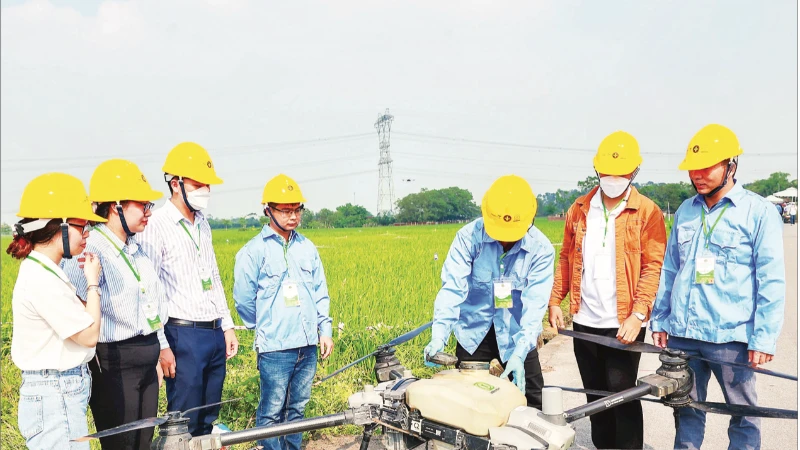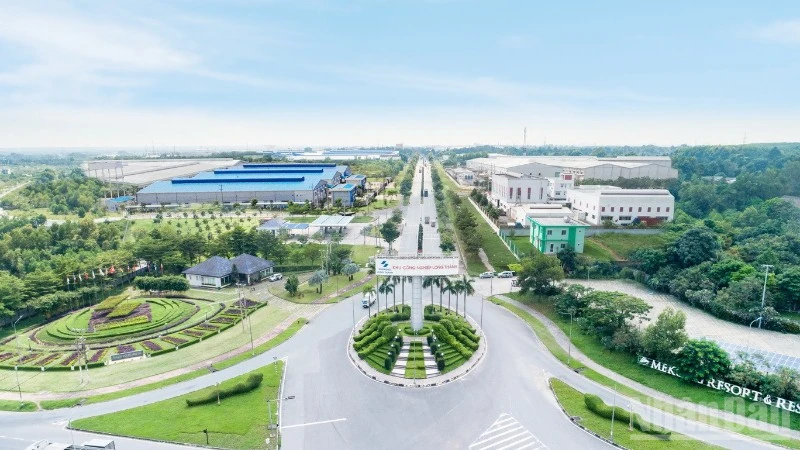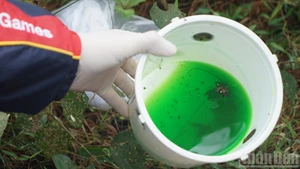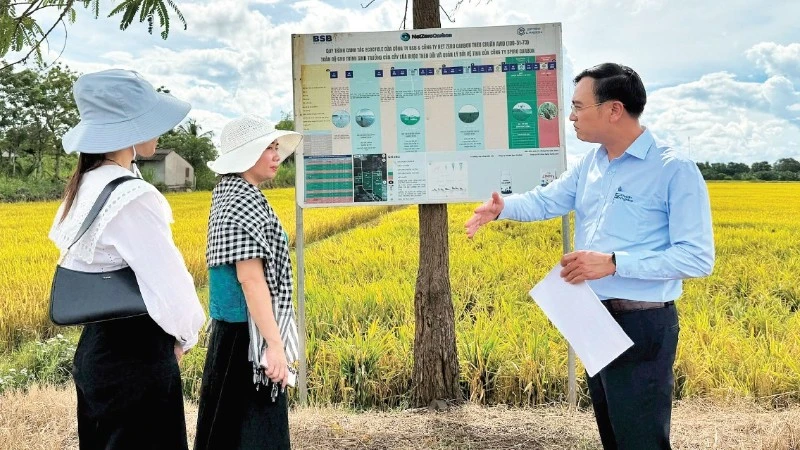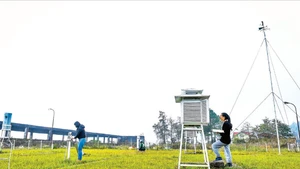Based on practical needs, the research, development and production of biological pesticides in our country has seen many positive changes in recent times.
From laboratory to field
In 2001, the Faculty of Agriculture at Can Tho University began laying the groundwork for developing biological solutions in plant protection. After seven years of research and selection of superior Trichoderma strains, this technology was transferred to Loc Troi Group (formerly An Giang Plant Protection Company) in 2009.
Huynh Minh Chau, Head of Product Research and Development (Loc Troi Group), said that Trico DHCT biological fungicide was the first product using active ingredients from Trichoderma spp strains licensed for circulation as a biological plant protection product by the Plant Protection Department (now the Department of Crop Production and Plant Protection) under the Ministry of Agriculture and Environment).
In 2014, the establishment of Loc Troi Biological Research and Production Centre marked a strong shift from laboratory research to industrial production and commercialisation of biological products and preparations. From the initial Trico DHCT product, Can Tho University continued to transfer other products to Loc Troi, such as Trico DHCT-Phytopth, Tricô DHCT-Pink fungus, and Trico DHCT-Stunted rice.
Trichoderma spp strains act as a biological defence barrier, both blocking and attacking harmful microorganisms thanks to their ability to compete for nutrients, secrete cell wall-degrading enzymes, and stimulate the plant's immune system. Applying Trichoderma, along with other beneficial microorganisms in general, not only helps to sustainably control pests but also contributes to protecting and balancing the microbial ecosystem, aiming for safe farming and long-term soil ecosystem restoration.
This product chain is selected from native Trichoderma spp strains and formulated with specialised action mechanisms for each group of pests. The focus is on crops such as fruit trees, industrial crops like pepper, coffee, and vegetables. On average, each year Loc Troi Group supplies the market with hundreds of tonnes of Trico DHCT products, with consumption sometimes exceeding 200 tonnes/year.
According to Huynh Tan Dat, Director of the Department of Crop Production and Plant Protection (Ministry of Agriculture and Environment), the country currently has 94 establishments qualified to produce plant protection products as per regulations, 85 of which produce biological plant protection products. Domestically produced formulations are mainly microbial, herbal, and biochemical plant protection products.
To date, Viet Nam has produced nearly 30 different types of finished plant protection products, including many advanced and safe formulations for humans such as water-dispersible granules, dispersible oils, water-soluble concentrates, and granules (WG, OD, SL, GR, etc.).
Additionally, globally popular technologies for producing biological plant protection products have also been registered, produced, and applied in Viet Nam, such as nano biological plant protection products, herbal extracts, products containing microorganisms, and some products derived from viruses or nematodes.
Recently, several experimental production projects aiming to transfer and apply into practice have also been researched and developed, such as: researching and producing Chaetomium preparations to control fungal diseases on tea, coffee, and rubber trees; researching production technology and applying Bio-VAAS.1 biological preparations to control yellow leaf, root rot, and gummosis on orange and durian trees; completing production technology and applying BIOFUN preparations to control mealybugs on coffee; and completing production technology and applying biological preparations to control bacterial wilt on peanuts.
Independent technology, focused investment
The research and application of biological plant protection products in Viet Nam has achieved some notable results. However, there are very few industrial-scale biological plant protection product production lines.
The reason is that most facilities' equipment is not synchronised, with many stages still carried out manually. Most enterprises depend on foreign partners, especially regarding copyrights, raw materials, and technology.
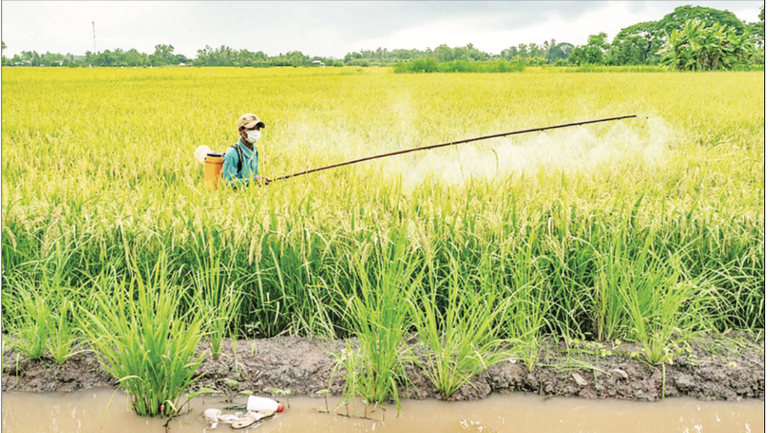
According to the Department of Crop Production and Plant Protection, applying research, testing, production, and technology transfer of biological plant protection products currently faces difficulties and lacks synchronisation due to the absence of coordination and linkage among production components, leading to obstacles in transfer and application. Most experimental research stops at the potential discovery stage in the laboratory without further in-depth research, finished product manufacturing, large-scale production technology transfer, or market introduction to serve consumers.
Many enterprises report that the current policies on developing biological plant protection products are not yet appropriate or strong enough to encourage research, production, business, and use of biological products. Although the procedures and registration criteria have been significantly reduced compared to chemical products, they remain cumbersome and complicated. The methods for testing and evaluating biological plant protection products are also technically limited.
Currently, Viet Nam has a scientific workforce with high professional qualifications, but there is no top-level scientific team dedicated to biological plant protection products capable of breakthrough research results. Research and production are still scattered and unfocused, thus failing to meet practical demand. Moreover, industrial-scale research and production equipment for biological plant protection products is very scarce, mainly consisting of small-scale, semi-manual production lines.
To improve the effectiveness of research and application of biological plant protection products in production, Nguyen Van Son, President of the Viet Nam Association of Plant Protection Product Producers and Traders, proposed that authorities urgently review the Plant Protection and Quarantine Law as well as the entire registration process and quality criteria with the aim to adjust and amend them to suit production realities.
Additionally, it is necessary to categorise specific groups of biological plant protection products and develop appropriate registration mechanisms for each type. To leverage the available resources of research centres and institutes, the state should soon issue socialisation policies for the research and production of biological plant protection products; supplement some support policies to encourage and incentivise organisations and enterprises investing in biological plant protection product technology production, such as: supporting procedures to receive technology, providing loans, leasing land for factory construction, and offering tax and fee incentives to develop products. At the same time, there should be a focus on training human resources, ensuring the right target groups, and prioritising the development of a strong workforce to carry out research, production, and technology transfer.
